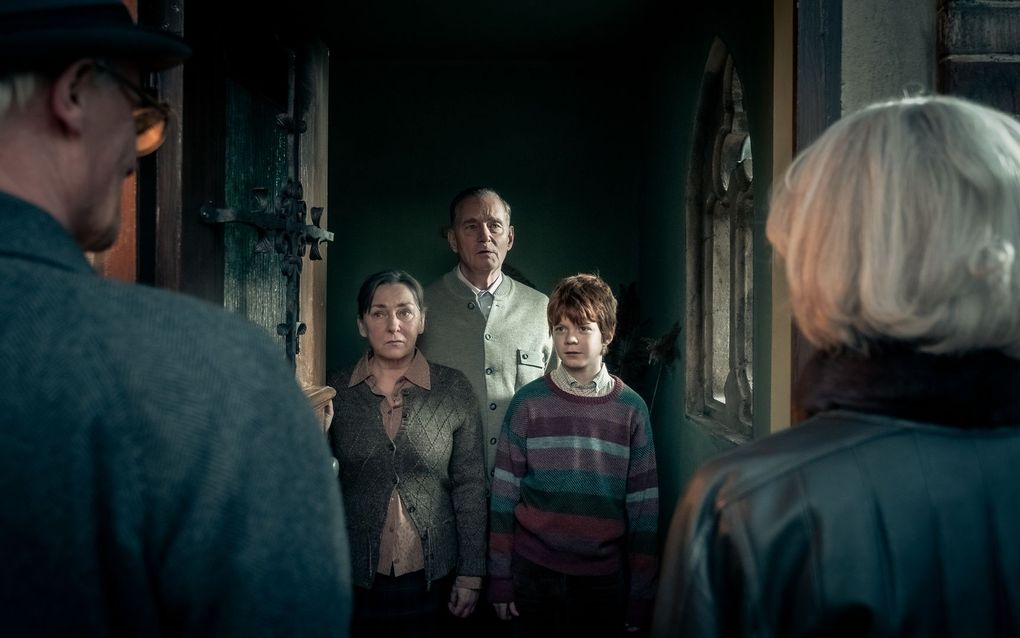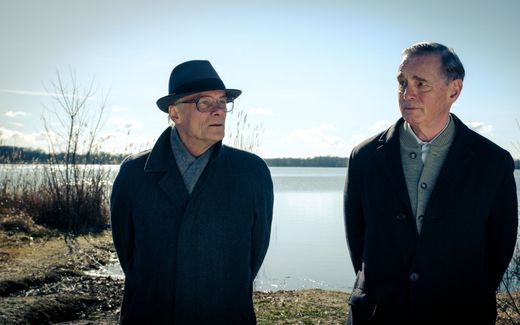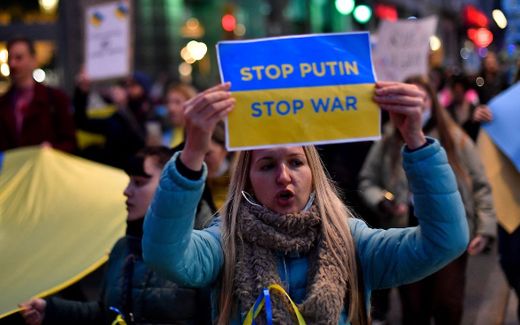GDR leader Honecker was offered shelter in pastor's home; son looks back
02-04-2022
Central Europe
Johannes Blöcher-Weil, PRO

In the back: Pastor and Mrs Holmer and their son Kornelius. In the front: Mr. Honecker and his wife. Photo ZDF
Central Europe
Kornelius Holmer was 14 years old when his parents took in the Honecker couple. In an interview with the Christian German magazine PRO, he tells how he experienced this time and what he thinks of the film “Honecker and the Pastor”.
What image did you have of Erich Honecker as a 14-year-old boy, Mr Holmer?
“Political developments have always been discussed at our dinner table. I had noticed how dissatisfied one of my older brothers was with life in the GDR. He complained about Honecker and the situation in the country.
My father never defended Erich Honecker. But he always told us that, as Christians, we do not speak badly of other people, even if we do not share their political views. I grew up with this attitude.”
How did you then perceive Erich Honecker in the nine weeks he lived with you and your family?
“I was three years older than Cornelius in the film. Erich Honecker was friendly and very attentive. He and his wife were convinced communists to the end. They firmly believed in what they represented.”

When did you hear that they would stay with your family?
“I can not say for sure. Honecker’s lawyers asked the church leadership if they knew of where he could stay. The request was then forwarded to my father, who was the manager of the Hoffnungstaler institutions in Lobetal (social welfare institutions, red.) at the time. He discussed this with the management and my mother.
Lobetal itself was out of the question. There was a long waiting list there. There could be no privileges. This gave my parents the idea that, as a family, we could take the couple in.”
What did your mother say about that?
“Both of my parents worked very closely together. If my mother had not wanted it, it would not have happened like this. The same applies to the most important employees in Lobetal and to us as children. My parents also asked my brother, who had fled to Hungary. His room was intended to house the Honeckers. If we had vetoed it, my parents would certainly have reconsidered it.”
When did your parents inform you?
“I think it was like a week before the arrived.”
Do you know what a decision like this meant?
“No. As a 14-year-old, I naturally found it exciting when the former head of the State Council lived with us. But I was not aware of the consequences of the decision.”
Did you find it difficult not to reject Erich Honecker and his wife?
“My siblings were not allowed to graduate from high school. Unlike them, I was not affected because I was too young. That is why it was not relevant to me. My mother had a hard time and struggled a lot with the decision. The documentation for the film illustrates this quite well. The movie is about the challenging question of how I deal with someone I have a grudge against. But I also found the days very exciting because my life has changed.”
Were there any specific hostilities that you can remember?
“During the first weekends, there were repeatedly angry protests in front of our house. People shouted: “No mercy for Honecker”. Thank God nobody climbed over the fence and got closer to the house. My parents also kept a lot hidden from us.
I can remember that we received two anonymous letters in quick succession. The first asked about the three worst Hs in history. Underneath were the names Hitler, Honecker and Hussein. In the second letter, a fourth H and our surname were added. I thought it was funny, even though it was intended to provoke.”
But you personally were not attacked?
“I experienced the demonstrations and all the mail my parents received. On the way home, the people in front of the house asked me to tell them why we were doing this. I then referred them to my mother. She then discussed a lot with the people at the fence. But a lot was not nearly as dramatic as it is portrayed in the film.”
Were you also afraid for your parents’ lives?
“Never. In an ARD documentary a few years ago, Hans Modrow explained that the GDR had let our family down through gross negligence. He later regrets that. I’ve been asked if I could forgive him. I replied that at my age, I had no idea how precarious the situation was at times.
In retrospect, everything went well. I just got on with my life, going to school and meeting friends at lunchtime. My 18-year-old brother must have heard more about it.”
Did you talk to him about it?
“Not about our feelings and experiences. Our parents wanted us to continue living our lives as normally as possible. For me, two elderly people in need of help were visiting us. I’ve always told the critics that they needed to see how old and frail the Honeckers are.
Before I went to school, I always said goodbye politely. When we came home in the afternoon, we talked about the day. Just like I would have done with my grandparents. That took out quite a bit of the explosiveness in the air. My parents were happy that I did not have any significant reservations and dealt with Honeckers quite normally.”
Surely this attitude rubbed you the wrong way at school?
“My classmates were my friends. They were all shaped by socialism. The name Honecker did not necessarily have negative connotations for them. For many families, socialism was progress, and capitalism was backwardness. The reunification seemed to some like a descent.
Of course, I always had to tell my buddies how things were with the Honeckers. I made it clear to them that these were ordinary people. Then, they were satisfied. If I get to know a public person privately, I perceive them differently than in public.”
What was the most impressive event of this time for you?
“The most impressive story I want to tell is when the Honeckers came back from Lindow. Even though it was dark, you could see how scarred he was by his cancer.
As he stood in front of the door, he said to my mother: “Now I’m home again.” That was a strong testimony for me. I would describe a home as a safe place where I can experience security.”
Is there a question you would like to ask Erich Honecker?
“I have a general question about socialism and its image of man. Socialism assumes that man is good. The Bible teaches us that man is evil from youth. With all the bad things happening in the world, socialists can not assume that people are good. Man can do good but not be good.
I would ask Honecker why he could never see that so much injustice had happened. Many young people’s lives were broken just because they wanted to leave the GDR or had contacts in the West. There was no insight that fundamental things were going wrong here.”
What does your parents’ action trigger in you: pride, admiration, or was it a matter of course?
“A bit of everything. I am grateful to my parents for their exemplary actions. They have helped people through whom they had experienced many bad things. My parents did that in absolute calm and serenity, without betraying themselves.
My father didn’t share Honecker’s political opinion, but he saw him as the person who needed help. He made no distinctions between a State Council President and others. That’s why I’m a little proud of my parents. Even if it should still be a matter of course if you want to remain true to yourself as a Christian, to do something like that, no matter how difficult it may be.”
Does the film “Honecker and the Pastor” provide a realistic picture of the situation at the time?
“When I first saw it, I had a hard time understanding how some things were implemented because a lot was so different. I had to break away from the image that reality is being implemented one-to-one. Of course, the director used tricks to clarify the themes of the film: namely mercy, forgiveness, and personal dealings with one another. In my environment, everyone found that strongly implemented. Every time I watch the film, I find the implementation more and more successful.”
Which tricks do you mean?
“The film uses some contrasts to clarify that it does not claim to portray what it was like in reality. A lot was worked with light and shadow and different music.”
How much film material is historical?
“There was a bomb threat, demonstrations and hostilities within the church against my father. Many later defended his decision, even if they initially saw it differently. My father also went for walks with the Honeckers. Unfortunately, the location of the shooting is not historical. All the people in the film, on the other hand, really existed. The drama of the demonstrations had, of course, been increased for the screenplay.
My parents are portrayed very differently in the film than they were in reality. The actress who played my mother had by far the most challenging role. She could no longer talk to my mother about her experiences. My mother was proud of her ten children. That comes across very well in the film.
My father is much happier than in the film. However, his way of talking about things as a theologian is well implemented. How the parents get through this phase together and still love each other is also very well done. Screenwriter Fred Breinersdorfer has always deliberately created opposites.”
Do you mind the differences from the story as it was?
“Of course, I have my perspective on what happened at the time. They are different from my parents or siblings who lived away from home. However, the film does not claim to be true, which I think is good and right. It was important to me that he didn’t ridicule anyone and didn’t take sides.
Everyone who knows our family and how much we love to sing knows that singing is not historical. The actor who played me conveyed my joy in the situation at the time well. Something was going on in our village. I found that exciting. In my opinion, the film is successful, and everyone should see it.”
To what extent was your family involved in the making of the film?
“In January 2019, I met Jan Josef Liefers and his team for a casual chat. He told me that the film was about forgiveness. He also wanted to talk to my father about it. Our interview was about God and the world, our childhood in the GDR and occasionally about the Honeckers, the events and my father’s motivation. I told my father about this. So he invited Liefers to his home.”
What would you do if you were faced with a decision like your parents did today?
“A difficult question. Of course, that would not be possible without consulting my family. Our children can also have a say. With the basic willingness to accept someone, I do not make a difference whether I like the person. I will probably not experience such a dramatic situation. So I can now give simple answers. I hope that I would do the same as my parents, also because of my Christian faith.”
This is a translation by CNE.news of an article previously published in PRO on March 25th, 2022.
Related Articles





